The local parks people have created the best outdoor ice skating arena I’ve ever seen here on Wasilla Lake, night lights and all.
~ a note from December 11, 2010
| A Big Data Bestseller! | |

|
Designing Data-Intensive Applications |
The local parks people have created the best outdoor ice skating arena I’ve ever seen here on Wasilla Lake, night lights and all.
~ a note from December 11, 2010
Started the drive back to Colorado at 5:50am EST Tuesday in Kentucky. Waited out the morning’s nasty snowstorm with some old-timers and truckers at a McD’s in Georgetown, Indiana.
Got tired of waiting, so when the snow let up a little I got back in the car. Maneuvered through snow-and-ice induced wrecks between Corydon and Evansville. Wanted to kiss the ground when it finally got dry after 11am. Drove through the sunset in Kansas, then followed the truckers, the Moon, and stars across the rest of Kansas and Colorado, arrived home at 12:20am MST Wednesday. Looking forward to seeing if the mountains are white whenever I wake up.
~ a note from December 11, 2013
Many moons ago, I took a very long vacation and spent a lot of time driving around Alaska and Canada. When I stopped at a restaurant in a small town in Canada, I learned this story about Robin Williams and the move, Insomnia. (See my website, One Man’s Alaska, for more stories.)
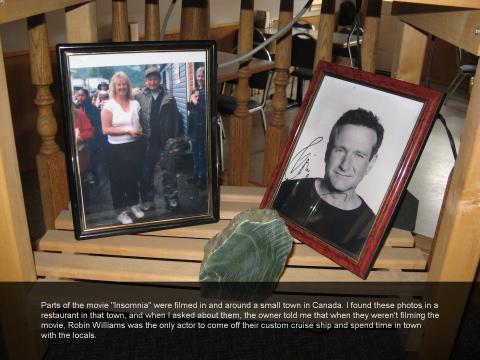
“It’s only fear that makes you run,
The demons that you're hiding from.”
~ Melissa Etheridge, I’m Not the Only One
Which reminds me of this:
“There are two kinds of people in Alaska: those who were born here, and those who come here to escape something. I wasn’t born here.”
~ Rachel Clement, Insomnia
“It’s very hard to grow, because it’s difficult to let go of the models of ourselves in which we’ve invested so heavily.”
~ from the book One Liners, by Ram Dass
As a brief note today, here are some examples of the Scala 3 for loop syntax, including the for/do and for/yield expressions that are new to Scala 3.
// single line
for i <- ints do println(i)
for (i <- ints) println(i)
// multiline
for
i <- ints
if i > 2
do
println(i)
You can also add end for to the end of a Scala 3 for loop, so the previous multiline example can also look like this:
for
i <- ints
if i > 2
do
println(i)
end for
When your for loops get longer, I find that adding end for to the end of them makes them easier to read.
These examples show how to use a for loop as the body of a Scala method:
import io.Source
def printLines1(source: Source): Unit =
for line <- source.getLines do println(line)
def printLines2(source: Source): Unit =
for line <- source.getLines
do println(line)
def printLines3(source: Source): Unit =
for line <- source.getLines
do
println(line)
def printLines4(source: Source): Unit =
for
line <- source.getLines
do
println(line)
def printLines5(source: Source): Unit =
for
line <- source.getLines
if line.trim != ""
do
// a multiline `do` block
println("in `do` block of `for`")
println(line)
Here are some single-line for/yield expressions:
I knew about GOTO statements from using FORTRAN, and today I learned about COMEFROM statements. For more information:
GOTO en.wikipedia.org/wiki/COMEFROM
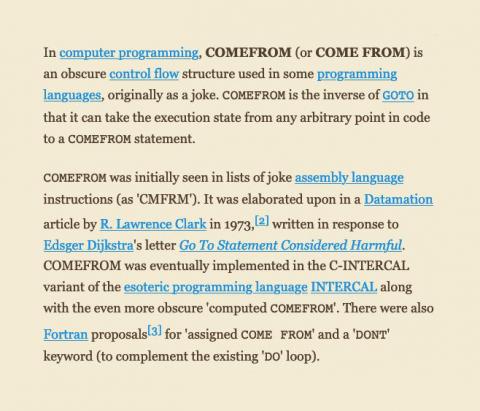
Scala FAQ: Can you show an example of the Scala 3 if-then-else-if syntax?
Here’s an example of the Scala 3 if-then/else-if/else syntax, as used as the body of a method:
Expectations lead to suffering. :)
(For Bodhi Day, December 8th of every year.)
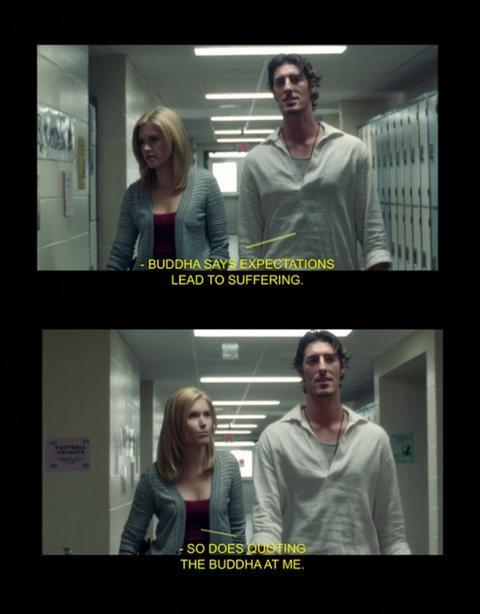
I took this photo of the Badlands in South Dakota on my drive up to Alaska in May, 2007. It’s still one of the most unique things I have seen.

If you use (a) a Mac/MacOS system, (b) Bash, (c) one or more Terminal tabs or windows, and (d) occasionally can’t find commands that should be in your Bash command history, you might find them in your ~/.bash_sessions directory. cd there and then grep for what you’re looking for.

Growing up, I remember that Dick Allen was considered a controversial figure, but I had no idea why, I was too young to comprehend those things. He passed away today, December 7, 2020, and the following text is from a story he tells in this video. The background is that the story takes place in 1963, in Little Rock, Arkansas, and he was a minor league baseball player:
They send me to Little Rock on a 24-hour recall, and left me there by myself. And when I say “myself,” I mean the only black player. Me being from Pennsylvania, I thought there was no racial tension, but geez, going to the soda machine to get a Pepsi out of the soda machine, and a cop car pulled in with the lights and there he is with a gun in my face. Hell, they’re trying to kill me right here. In America.
I come home, I think it was only a nickel or dime, and I put it in the pay phone. “Mama, I want to come home.”
You listen to me, boy, you hear me?
Back in May, 2007, on my drive up to Alaska, I stopped at Mt. Rushmore. One of my former co-workers found this little genie figurine that I/we started referring to as Little Buddha. When I held it up to take this photo, some guy that was also visiting there got really upset with me, and his wife had to calm him down.

Thanks to this Twitter post, and the image shown here from this NASA page, I now know what an analemma is.

At some point over the last few months I realized that nobody in the fitness center wears a mask, so I haven’t exercised significantly since September. So I was pleasantly surprised to see my heart rate get down into the low 50s, even without that exercise.
I woke up at 3am and made some notes about a long dream sequence, which seems to correspond to the low in my little dipper there.
In a related note, if I die from a lack of exercise, this is a result of Covid-19: People don’t wear masks, so I don’t go to exercise in the fitness center. I can walk outside, but that’s nowhere near the level of exertion I can get on an elliptical trainer. (And you can’t really bike-ride safely in this area.)
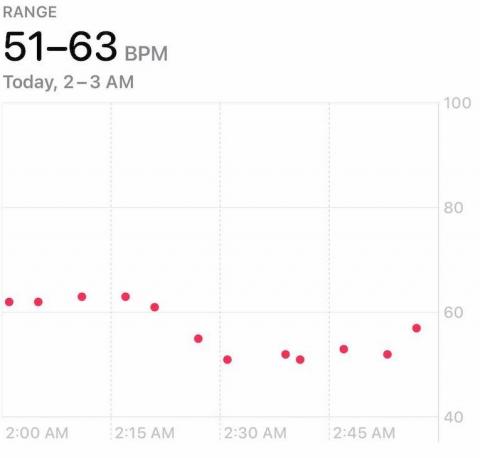
Season 2, Episode 8 of Fringe, titled, August, has to be one of the Top 10 episodes of that series.
“She seduced me with baked goods.”
~ Walter talking about Fauxlivia (alternate universe Olivia) on Fringe
Back in 2018 I couldn’t find any decals I liked, so I bought some black chalkboard paint and painted the old computer I use as a Linux laptop. With a piece of chalk, I can now have a different logo on it whenever I want a new one. :)
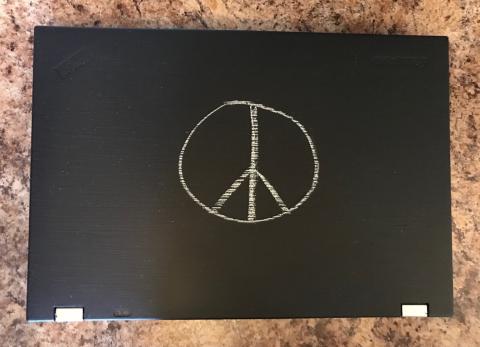
For a variety of reasons I recently wrote an “intentionally slow” HTTP socket server using Scala 3. Though I also wanted to test some things with Scala 3, the main reason for writing it is so I can test some client-side code, and make sure I handle server-side timeouts correctly.
As a brief note to self, this is an example sbt build.sbt file I just used for a Scala 3 (3.0.1) project on July 22, 2021, including several scalacOptions:
| A Big Data Bestseller! | |

|
Designing Data-Intensive Applications |